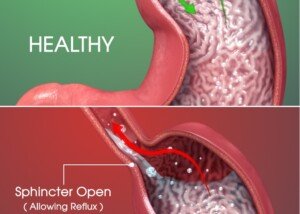
You have GERD and you’ve been experiencing an elevated heart rate without exertion.
Could there be a connection?
The elevated heart rate may occur while you’re at your computer, watching TV, texting or while lying in bed at night or in the morning.
It would be nice to know that the GERD is causing the elevated heart rate rather than a problem with your heart such as a rhythm disorder.
Can gastroesophageal reflux disease make one’s heart beat faster?
“Not usually; it’s unlikely that acid reflux will cause elevated heart rate,” says Dr. Saurabh (Seth) Sethi, MD, a Harvard University and Stanford University trained board-certified gastroenterologist practicing in the San Francisco bay area.
Dr. Sethi further explains, “Anxiety may be a cause of increased heart rate. If the symptoms of GERD make one anxious, GERD can be an indirect cause of elevated resting heart rate.”
For instance, if acid reflux is causing a burning or aching sensation in your chest or upper abdomen, this symptom can create an uneasy feeling or anxiety — which would then speed up the pulse.
But what if you don’t have such symptoms yet your pulse is fast while you’re at rest?
Though general anxiety in your life can be the cause, you should get a checkup by a cardiologist just to be sure that nothing else is going on.
Remember, a normal pulse is 60 to 100 beats per minute.
And here is something to consider: Anxiety can cause acid reflux!
So while that anxiety is making your heart race, it’s also making the acidic juices in your stomach spurt up into your esophagus.
If you’ve been having periods of an unexplained fast pulse — over 100 beats per minute — you really should see a cardiologist.
Maybe it’s only anxiety, but think about the peace of mind a normal cardiac workup would bring!
And if it turns out that you DO have a problem with your heart, it may be a very treatable condition or something that doesn’t even require treatment other than symptom relief.

 Follow
Follow 







































